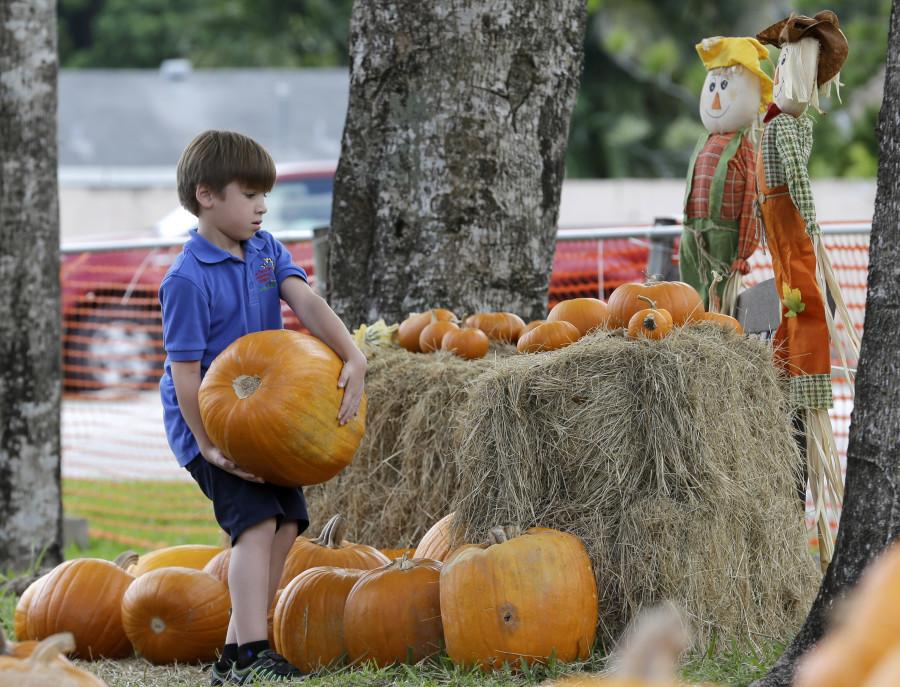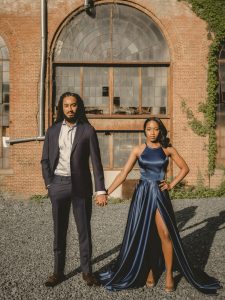The connection between Halloween and religion
Families prepare to pick their pumpkins for the upcoming Halloween holiday. (AP Photo/Alan Diaz)
October 30, 2015
“Put the hallow back in Halloween” might sound like nothing more than a jab at the “Christ back in Christmas” campaign that pops up every year, but there may be truth in the statement.
While most of us associate Halloween with costumes, candy and tricks, the holiday has distinct roots in Christian and Celtic traditions, according to Judith Gruber, religious studies professor.
“The word ‘Halloween’ itself comes from the Christian tradition. It means hallowed evening, or holy evening,” Gruber said.
In the Christian calendar, Halloween is the day before All Saint’s day, which is a day to honor the saints; the day after is a day to remember the dead.
On Oct. 31, the Church would traditionally hold a vigil to prepare worshippers with prayers and fasting before these two important days. This became known as All Hallows’ Eve, Gruber said.
The holiday can be traced back even further to the ancient Celtic festival Samhain, which Gruber said was later Christianized by the early Church.
She added that it was believed that during Samhain, the spirits of the dead were able to mingle with the living, and remnants of the Samhain festival are still apparent in today’s traditions.
Jack Santino, academic folklorist from the American Folklife Center, said that almost all the Halloween traditions can be traced back to the ancient Celtic day of the dead.
“Halloween is a holiday of many mysterious customs, but each one has a history, or at least a story behind it,” Santino said.
One particular Samhain tradition is called “mumming” in which people would dress in masks and ask their neighbors for soul-cakes, or cakes for wandering souls.
Santino added that with time, this practice evolved into the tradition we know today as trick-of-treating, although of course without the expectations of lost souls wandering to your door, begging for cakes.
The connections between Christianity and Halloween may be surprising to some because of the Satanic imagery so frequently associated with the holiday.
However, Katharine Mahon, a third-year Ph.D. student in theology and history at Notre Dame and regular contributor for the Daily Theology, said that same imagery is a clue to that connection.
“Despite the fact that Halloween seems to celebrate the macabre, there is something inherently Christian, Catholic, particularly, about much of the Halloween spirit. Many of the hallmarks of Halloween, such as ghosts, demons, paranormal events, and even vampires, come out of the Christian tradition,” Mahon said.
According to Gruber, some Christians do not want to be connected with this imagery because of the popular association of Halloween and Paganism.
“However, it must be said that all Christian traditions can be traced back to older, non-Christian origins. Halloween is no exception. Therefore, the majority of Christians today feel that Halloween is valuable because it allows us to take time to reflect on our mortality and to remember death as a part of our life in a celebratory way,” Gruber said.
Even so, others are trying to move the holiday away from Satanic images towards traditions that can be more positively related to the holiday, according to Mahon.
“Halloween is so far removed from All Saints’ Day in the minds of most, and so closely associated with dark, evil, and demonic imagery, that more Evangelically-minded Protestant and Catholic communities try to encourage Christian versions of the holiday and its traditions instead. You have to admit that there’s some irony in trying to Christianize an originally Christianized holiday,” Mahon said.







